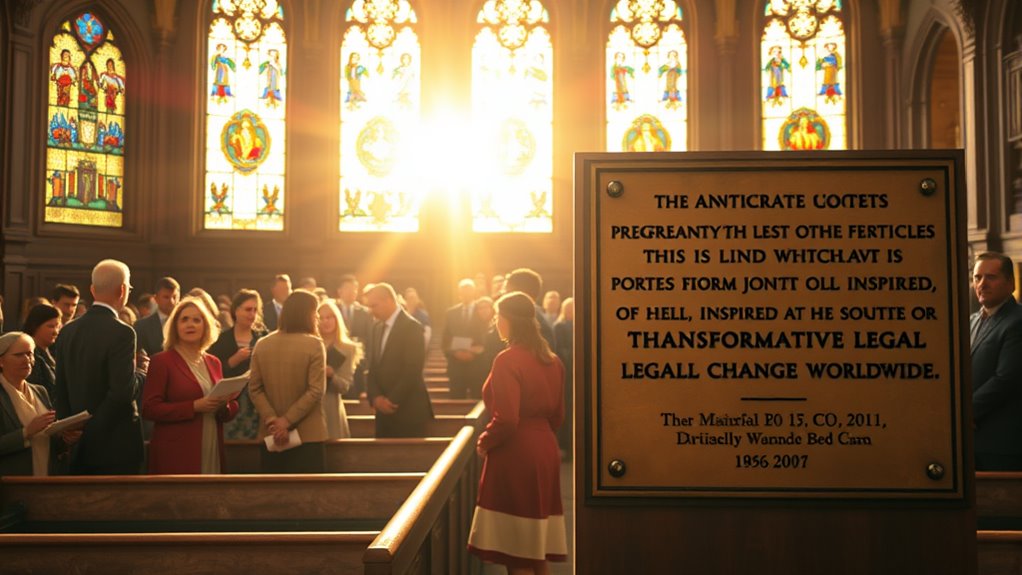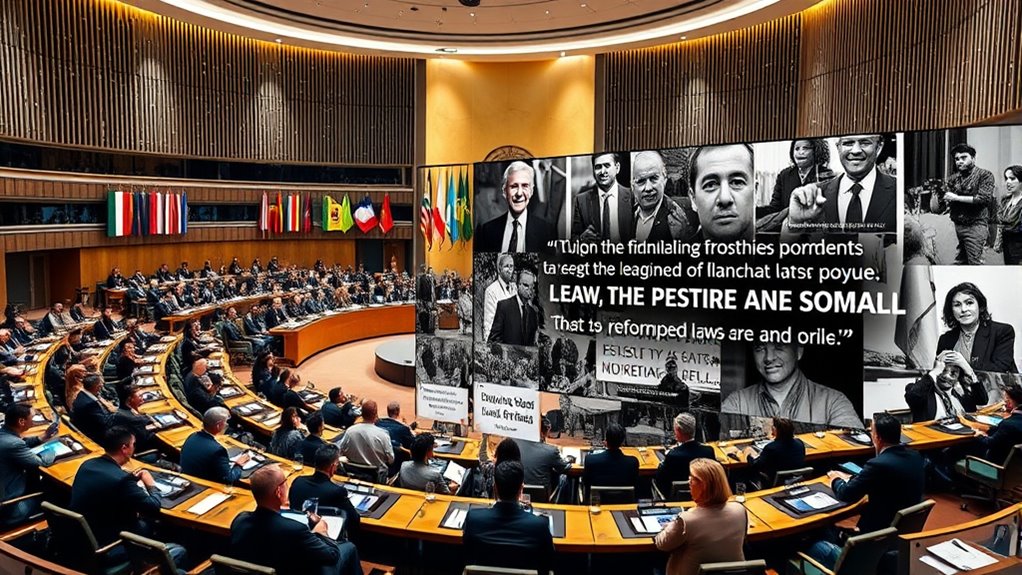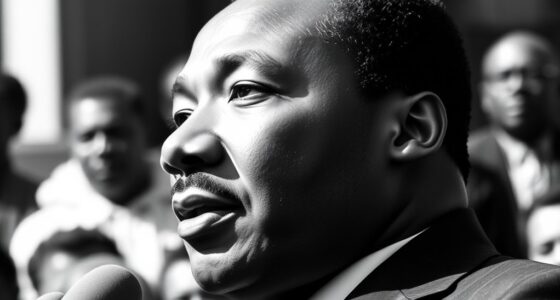Throughout history, powerful quotes have sparked legal and societal shifts worldwide, inspiring movements for human rights and environmental justice. From Martin Luther King Jr.’s “I have a dream” to environmental calls like “We do not inherit the earth from our ancestors; we borrow it from our children,” these words have pressured lawmakers to change laws and challenge norms. Understanding these impactful statements reveals how language can ignite lasting change, and there’s more to discover if you explore further.
Key Takeaways
- Influential quotes inspire social movements that lead to significant legal reforms worldwide.
- Pivotal statements highlight moral imperatives, pushing policymakers to enact new laws.
- Words from leaders and activists mobilize public opinion, catalyzing policy changes.
- Recognizing impactful quotes helps understand how language shapes legal and societal progress.
- Enduring quotes serve as symbols of change, motivating ongoing advocacy for rights and justice.

Throughout history, powerful words have sparked significant legal changes, shaping the laws that govern society today. When influential figures speak out, their words can challenge injustices and inspire action that leads to lasting reform. These quotes often serve as rallying cries for civil rights and environmental justice, motivating movements that push governments to rewrite laws and improve lives. You might not realize it, but a single impactful statement can become the catalyst for sweeping legal shifts, transforming societal norms and protections.
Powerful words have historically driven legal change and societal progress.
Take, for example, Martin Luther King Jr.’s famous words, “I have a dream.” This phrase encapsulated the aspiration for racial equality and civil rights, fueling the Civil Rights Movement of the 1960s. His speech energized countless individuals and pressured lawmakers to pass landmark legislation like the Civil Rights Act of 1964. That act outlawed discrimination based on race, color, religion, sex, or national origin, fundamentally changing the legal landscape in America. Your awareness of such quotes helps you understand how language can mobilize masses and influence policy changes that promote justice and equality.
Similarly, environmental justice gained momentum through words that drew attention to ecological issues and social inequalities intertwined with environmental harm. When environmental advocates declare that “The Earth does not belong to us; we belong to the Earth,” they emphasize the importance of protecting natural resources for future generations. This kind of rhetoric has helped sway public opinion and prompted governments to enact laws like the Clean Air Act and the Endangered Species Act. These laws were driven by the recognition that environmental degradation disproportionately affects marginalized communities, highlighting the need for legal reforms rooted in environmental justice principles.
You see, these quotes do more than inspire; they create a sense of urgency and moral clarity. They challenge the status quo, urging lawmakers and citizens alike to act. Whether addressing civil rights or environmental concerns, these words serve as a reminder that language is a powerful tool for change. They remind us that laws are not static; they evolve through persistent advocacy and the compelling voices that push for justice. Recognizing the power of language helps us understand how words can influence legal systems and promote social progress. By recognizing these pivotal quotes, you gain insight into how words shape policies that protect human rights and the environment. These statements stand as testaments to the idea that a single phrase, spoken at the right moment, can alter the course of history and bring about meaningful legal reforms.
Frequently Asked Questions
How Do Quotes Influence Legal Reforms Globally?
You see, quotes can shape legal reforms by resonating within their historical context and cultural influence. When a powerful quote captures public sentiment or moral values, it sparks debate and motivates change. You can leverage these words to challenge outdated laws or promote new policies. As a result, quotes become catalysts, inspiring lawmakers and society to rethink and reshape legal frameworks, fostering progress and social justice.
Which Quote Had the Most Lasting Impact on Human Rights?
You should recognize that the quote with the most lasting impact on human rights often comes from figures like Martin Luther King Jr., whose words gained moral authority and resonated culturally. His famous “I Have a Dream” speech inspired global movements for equality and justice, shaping policies and attitudes. Its moral authority and cultural resonance continue to influence human rights efforts today, making it a cornerstone for ongoing advocacy and reform.
Are There Specific Countries More Influenced by Powerful Quotes?
Imagine countries as vast ships, each guided by the compass of powerful words. You’ll find that some nations, like the United States or South Africa, are more strongly influenced by these words due to their historical influence and cultural impact. These quotes serve as beacons, steering policy shifts and societal change. Your understanding reveals that certain countries are more profoundly shaped by the enduring power of impactful quotes.
How Do Political Leaders Select Quotes to Promote Change?
When selecting quotes to promote change, you focus on speech tactics that resonate culturally and emotionally. You choose powerful, memorable words that align with your message and inspire action. By considering the audience’s values and beliefs, you guarantee your quote has cultural resonance, making it more impactful. This strategic approach helps you rally support, influence policies, and create lasting change through carefully crafted, compelling messages.
Can a Single Quote Really Alter National or International Policies?
You might wonder if a single quote can truly change policies. For example, in 1963, Martin Luther King Jr.’s “I Have a Dream” speech, rooted in historical context and cultural influences, inspired civil rights legislation. While one quote alone doesn’t enact change, it can spark awareness and motivate leaders. So, yes, a powerful quote can influence national or international policies by shaping public opinion and inspiring action.
Conclusion
These powerful quotes remind you how words can spark change, inspiring laws that shape society. You might think one voice isn’t enough to make a difference, but history proves otherwise. When you speak up or share a quote that resonates, you join a movement for justice and progress. So, don’t underestimate your words—your voice can be the catalyst for real change in the world.










